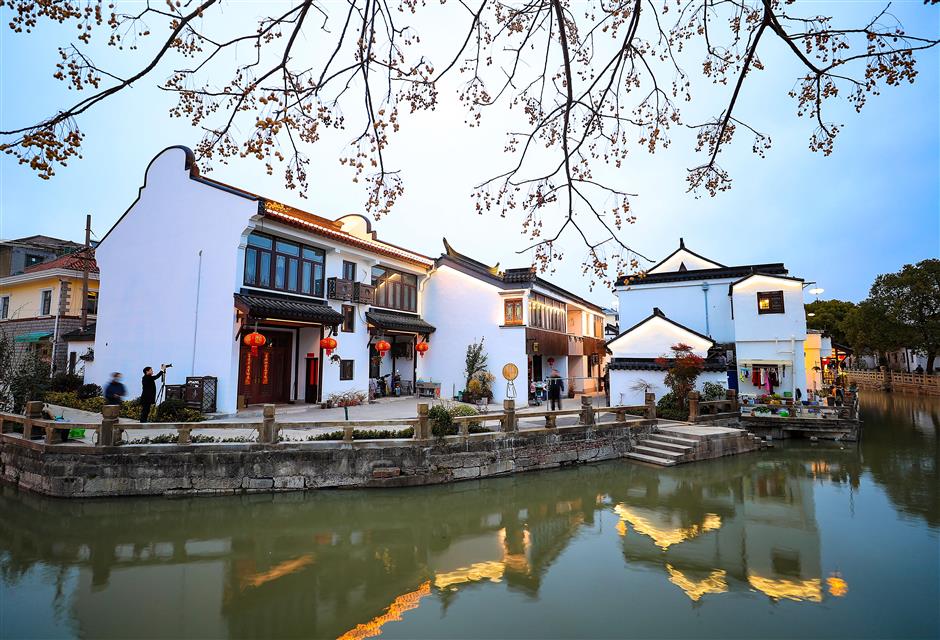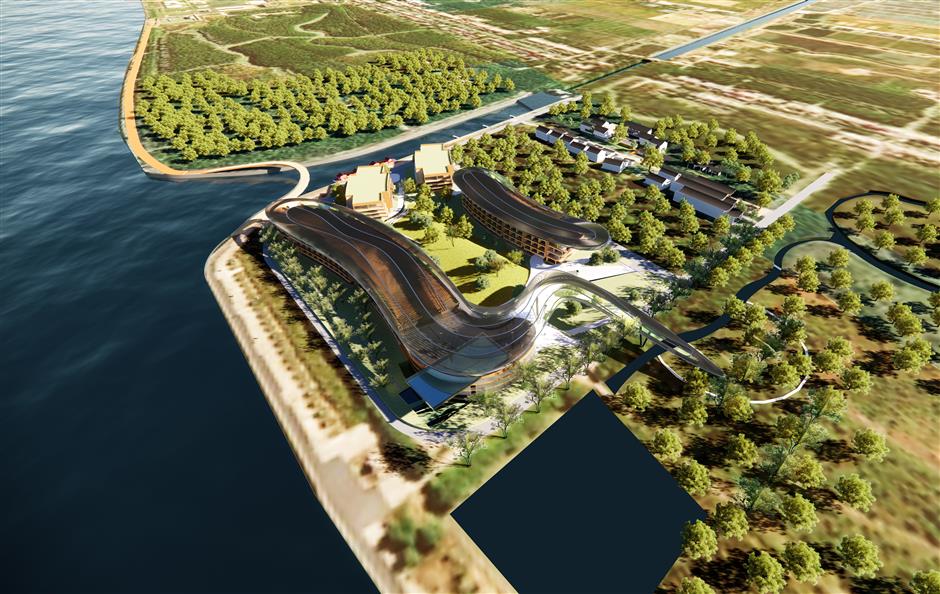Ancient town a vanguard for rural revitalization on city's outskirts

Lengjiang Yuxiang street, or Cold River Rain Lane, features well-preserved architecture dating back to the Ming and Qing dynasties.
Preservation work has been completed on an ancient Ming Dynasty (1368-1644) town's street on Shanghai's outskirts and it is ready to receive citizens and tourists during the weeklong National Day holiday from Saturday.
Lengjiang Yuxiang street, or Cold River Rain Lane, in historic Zhuanghang Town of Fengxian District features well-preserved architecture dating back to the Ming and Qing (1644-1911) dynasties on both sides of the 1-kilometer stretch.
It tracks alongside the Lengjiang, literally meaning Cold River, which is a tributary of Huangpu River and was once a busy waterway for the prosperous commercial town.
Many historical stores and sites in the area have been preserved. They include a fire prevention facility established early last century, a shop selling traditional blue cloth, a listed intangible cultural heritage of Shanghai, and the Dingfeng Fermentation Food Co, the city's oldest remaining soy sauce factory which opened in 1864.
Dingfeng is a time-honored brand in Shanghai, making soy sauce and fermented bean curd in the traditional way. The main factory has been relocated, but some traditional workshops are still making sauce for nearby residents and the aroma permeates the whole town.
A museum celebrating the company and its manufacturing procedures has been set up at a former rural supply and marketing cooperative, a "planned economy" heritage site.

Lengjiang Yuxiang street in the historic Zhuanghang Town of Fengxian District
"The ancient street project, along with other measures, is expected to develop the traditional agricultural town into a demonstration site of the nation's rural revitalization campaign," said Tao Qing, Party secretary of Zhuanghang.
The town originated during the Song Dynasty (960-1279) and historically has been the agricultural base of the city. It features Shanghai's best paddy fields, for both high quality and production.
It has also maintained many traditional folk arts such as paper-carving, agricultural poetry and the Hanguang ceramic, a local intangible cultural heritage. The porcelain is renowned for its purity, smoothness and elegant illustrations.
Much of the town's cultural heritage is showcased in renovated country houses or villages along the old street, as numerous inheritors are still living there.
Some abandoned artefacts such as millstones and plows have been collected to decorate houses that have become homestays or small eateries.
The former ponds used to raise fish and crabs have been made into a single water catchment for tourists to have fishing contests. A century-old residential house is now a museum which showcases the history of the village.

Some houses have become homestays or small eateries on Lengjiang Yuxiang street in the historic Zhuanghang Town.
Villagers have been encouraged to rent their houses to the township government so the buildings can be converted into homestay projects and offices for start-ups. The authorities have relocated some of the villagers to newly built modern residential neighborhoods.
Over 40 farmers' houses have been converted into company headquarters, talent apartments and homestay projects to help boost both the regional economy and the incomes of the town's farmers, said Wang Wankuan, the governor.
A house owner, for example, can receive about 50,000 yuan (US$7,030) a year if their property is renovated for use as a company headquarters or minsu (B&B), compared with 20,000 yuan per year in the normal rental market.
An ancient village named Yuli, which is a kilometer away from Huangpu River, is being redeveloped into Shanghai's first fashion music town. It aims to attract leading domestic culture and entertainment firms along with their famous pop stars.
Most of the 34 households of villagers have agreed to revamp their houses into villas to accommodate the singers and musicians, who are expected to get inspired by the rural environment and the village's fresh air, Wang said.
The annual tax revenue is expected to reach 200 million yuan within three years, a return that would be unimaginable under the traditional agricultural development mode, Wang added.
A luxury hotel has also been planned near the revamped rural villages. The Xiaoya Luming Hotel, which takes its name from the "Book of Songs," will have about 300 accommodation rooms, plus restaurants, entertainment areas, meeting rooms and commercial complexes.

Rural houses have been converted into villas to accommodate professionals and artists.

A company headquarters built alongside a large paddy field in Zhuanghang Town.

An artist's rendition of a future luxury hotel to be built near Zhuanghang Town
















